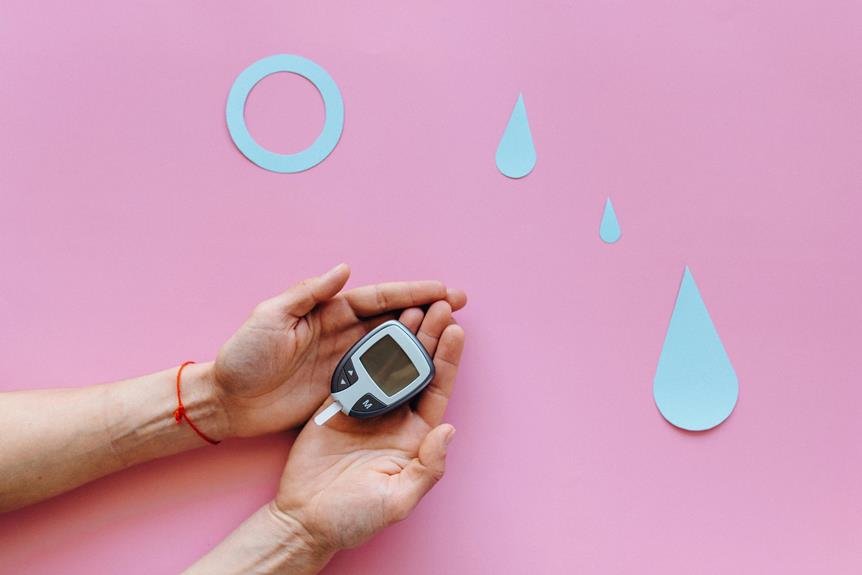Prediabetes and Sleep: Why Quality Rest Is Crucial for Blood Sugar Regulation
Did you know that up to 84% of individuals with prediabetes have an underlying issue with sleep quality? Understanding the intricate relationship between prediabetes and sleep is essential for managing blood sugar levels effectively.
By exploring how sleep impacts insulin resistance, circadian rhythm, and deep sleep stages, you can uncover the critical role that rest plays in regulating blood sugar.
Stay tuned to discover practical tips on enhancing your sleep quality and creating a sleep-friendly environment to support your overall health and well-being.
Impact of Sleep on Prediabetes
Getting enough quality sleep can significantly impact your prediabetes condition. When you prioritize restful sleep, you give your body the chance to regulate blood sugar levels effectively. Research shows that inadequate sleep can lead to insulin resistance, a key factor in the development of prediabetes. By consistently getting the recommended 7-9 hours of quality sleep each night, you can help your body maintain proper insulin sensitivity and reduce the risk of progressing to type 2 diabetes.
During sleep, your body goes through essential processes that influence glucose metabolism and insulin regulation. When you're sleep-deprived, your body may struggle to process glucose efficiently, leading to higher blood sugar levels. This can put added stress on your pancreas, which produces insulin to help cells absorb glucose for energy. By establishing a consistent sleep routine and creating a restful sleep environment, you can support your body in managing blood sugar levels and promoting overall health.
Sleep Deprivation and Insulin Resistance
When you consistently don't get enough sleep, your body's ability to use insulin efficiently decreases, leading to insulin resistance.
This resistance can result in difficulties regulating your blood sugar levels, increasing the risk of developing prediabetes or type 2 diabetes.
Prioritizing quality rest is crucial to support your body in maintaining proper insulin sensitivity and blood sugar control.
Lack of Sleep Impact
Lack of quality sleep directly correlates with insulin resistance, a key factor in the development of prediabetes. When you don't get enough rest, your body's ability to regulate blood sugar is compromised. Research shows that sleep deprivation can lead to decreased insulin sensitivity, making it harder for your cells to respond to insulin effectively. This can result in higher blood sugar levels, potentially increasing the risk of developing prediabetes.
Additionally, inadequate sleep affects hormones that control appetite, often leading to unhealthy food choices and weight gain, both of which are linked to insulin resistance. Prioritizing good sleep habits is crucial in maintaining optimal blood sugar levels and reducing the risk of prediabetes.
Insulin Sensitivity Decrease
Quality sleep is crucial for maintaining optimal insulin sensitivity levels and regulating blood sugar effectively. When sleep is insufficient, the body becomes less responsive to insulin, leading to insulin resistance. This resistance can elevate blood sugar levels and potentially progress to prediabetes or type 2 diabetes. Sleep deprivation disrupts hormone levels that regulate glucose metabolism, compounding insulin sensitivity problems. Inadequate sleep also disturbs the circadian rhythm, affecting hormone release that controls blood sugar. Prioritizing quality rest is key to preventing insulin sensitivity decline and preserving overall health.
Sleep plays a vital role in maintaining optimal insulin sensitivity levels. When you don't get enough sleep, your body becomes less sensitive to insulin, leading to insulin resistance. This means that your cells don't respond well to insulin, causing higher blood sugar levels. Insulin resistance can eventually progress to prediabetes or type 2 diabetes if left unchecked. Sleep deprivation interferes with the hormone levels that regulate glucose metabolism, further exacerbating insulin sensitivity issues. Additionally, inadequate sleep can disrupt your circadian rhythm, affecting the release of hormones that control blood sugar levels. Prioritizing quality rest is essential in preventing insulin sensitivity decrease and maintaining overall health.
Blood Sugar Regulation
Ensuring you get enough quality sleep is crucial for regulating your blood sugar levels and preventing insulin resistance.
Sleep deprivation can disrupt your body's ability to use insulin effectively, leading to higher blood sugar levels. When you don't get adequate rest, your cells become less responsive to insulin, resulting in insulin resistance. This resistance can make it harder for your body to regulate blood sugar, potentially increasing your risk of developing prediabetes or type 2 diabetes.
By prioritizing good sleep habits, such as maintaining a consistent sleep schedule and creating a relaxing bedtime routine, you can support your body in maintaining healthy blood sugar levels and reducing the likelihood of insulin resistance.
Circadian Rhythm and Blood Sugar
Understanding how your body's internal clock, known as the circadian rhythm, influences your blood sugar levels throughout the day is crucial for managing prediabetes and promoting overall health. Your circadian rhythm follows a 24-hour cycle, regulating various bodily functions, including the release of hormones that impact blood sugar.
Cortisol, a hormone that helps control blood sugar, follows a specific pattern throughout the day, typically peaking in the early morning to help you wake up and declining at night to promote sleep.
Melatonin, another hormone influenced by the circadian rhythm, plays a role in regulating blood sugar levels as well. Disruptions to your circadian rhythm, such as irregular sleep patterns or night shift work, can lead to dysregulation of these hormones and potentially result in higher blood sugar levels.
Importance of Deep Sleep Stages
Deep sleep stages play a crucial role in optimizing your body's restorative processes and supporting overall health, especially in relation to managing blood sugar levels and prediabetes risk. During deep sleep, your body repairs tissues, builds bone and muscle, and strengthens the immune system. This stage is essential for regulating hormones like insulin, which is crucial for blood sugar control. Research suggests that deep sleep helps improve insulin sensitivity, reducing the risk of developing prediabetes and type 2 diabetes.
Furthermore, deep sleep plays a significant role in controlling appetite-regulating hormones, such as leptin and ghrelin. When you don't get enough deep sleep, these hormones can become imbalanced, leading to increased hunger and potentially poor food choices that impact blood sugar levels. Prioritizing deep sleep can help you maintain a healthy weight, which is essential for managing prediabetes.
To enhance deep sleep, establish a consistent sleep schedule, create a relaxing bedtime routine, and ensure your sleep environment is conducive to quality rest. By prioritizing deep sleep, you can better regulate blood sugar levels and reduce your risk of prediabetes.
Tips for Improving Sleep Quality
To improve your sleep quality, focus on establishing good sleep hygiene practices and creating a consistent bedtime routine.
These simple habits can help signal to your body that it's time to wind down and prepare for rest.
Sleep Hygiene Importance
Improving your sleep quality is key to managing prediabetes and promoting overall health. Maintaining good sleep hygiene is crucial for regulating blood sugar levels.
To enhance your sleep quality, establish a consistent sleep schedule by going to bed and waking up at the same time every day. Create a relaxing bedtime routine that includes activities like reading or taking a warm bath to signal to your body that it's time to wind down.
Keep your bedroom dark, cool, and quiet to create an optimal sleep environment. Avoid stimulants like caffeine and electronics close to bedtime.
Bedtime Routine Tips
Establishing a bedtime routine is crucial for optimizing your sleep quality and supporting your body's ability to regulate blood sugar levels effectively. To enhance your sleep, try to go to bed and wake up at the same time every day, even on weekends.
Engage in relaxing activities before bed, such as reading a book or taking a warm bath, to signal to your body that it's time to wind down. Limit screen time before bed as the blue light emitted from devices can disrupt your sleep.
Make sure your bedroom is conducive to sleep by keeping it dark, quiet, and at a comfortable temperature. By incorporating these bedtime routine tips, you can improve your sleep quality and better manage your blood sugar levels.
Creating a Sleep-Friendly Environment
Ensure your bedroom is a serene oasis conducive to restful sleep by implementing simple, calming changes. Start by keeping your bedroom dark, quiet, and cool. Invest in blackout curtains to block out any unwanted light, use earplugs or a white noise machine to drown out disruptive sounds, and set the thermostat to a comfortable temperature around 60-67°F.
Declutter your sleep space to create a sense of calm and order. Consider removing electronics, work-related items, or anything that may cause distractions. Opt for soothing colors like soft blues, greens, or earth tones on your walls and bedding to promote relaxation. Additionally, choose comfortable bedding and a supportive mattress to enhance your comfort.
Frequently Asked Questions
Can Sleep Quality Affect Prediabetes Risk Factors Other Than Blood Sugar Regulation?
Quality sleep directly impacts prediabetes risk factors beyond blood sugar regulation. Your overall health, metabolism, hormone balance, and inflammation levels are all influenced by the quality and duration of your sleep. Prioritize rest for optimal health.
How Does Chronic Sleep Deprivation Impact the Body's Ability to Regulate Insulin Levels?
When you skimp on sleep, it's like sending your body's insulin regulation system on a rollercoaster ride. Chronic sleep deprivation messes with your body's ability to control insulin levels, throwing your balance off-kilter.
What Role Does the Circadian Rhythm Play in Blood Sugar Fluctuations in Individuals With Prediabetes?
Your body's circadian rhythm helps regulate blood sugar levels in prediabetes. Sleep quality impacts this rhythm, affecting how well your body manages glucose. Consistent rest supports stable blood sugar, essential for managing prediabetes effectively.
Are There Specific Deep Sleep Stages That Are Particularly Important for Blood Sugar Regulation in Prediabetic Individuals?
During deep sleep, stages three and four are crucial for blood sugar regulation in prediabetic individuals. These stages help balance glucose levels and promote insulin sensitivity, contributing to better overall blood sugar control.
How Can Creating a Sleep-Friendly Environment Help Improve Blood Sugar Control in Individuals at Risk for Prediabetes?
To improve blood sugar control and help prevent prediabetes, create a sleep-friendly environment. Keep your room cool, dark, and quiet. Stick to a consistent sleep schedule, limit screen time before bed, and relax with calming activities.
Conclusion
In conclusion, just like a well-oiled machine needs proper maintenance to function smoothly, your body requires quality sleep to regulate blood sugar levels effectively.
Think of sleep as the fuel that keeps your blood sugar engine running smoothly.
By prioritizing deep sleep stages and creating a sleep-friendly environment, you can support your body in managing prediabetes and maintaining overall health.
So, make sure to give your body the rest it needs to keep your blood sugar in check.





